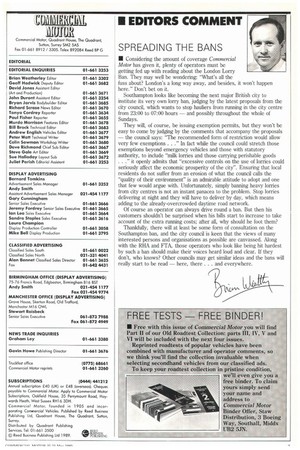SPREADING THE BANS
Page 5

If you've noticed an error in this article please click here to report it so we can fix it.
• Considering the amount of coverage Commercial Motor has given it, plenty of operators must be getting fed up with reading about the London Lorry Ban. They may well be wondering: "What's all the fuss about? London's a long way away, and besides, it won't happen here." Don't bet on it.
Southampton looks like becoming the next major British city to institute its very own lorry ban, judging by the latest proposals from the city council, which wants to stop hauliers from running in the city centre from 23:00 to 07:00 hours — and possibly throughout the whole of Sundays.
They will, of course, be issuing exemption permits, but they won't be easy to come by judging by the comments that accompany the proposals — the council says: "The recommended form of restriction would allow very few exemptions . . ." In fact while the council could stretch those exemptions beyond emergency vehicles and those with statutory authority, to include "milk lorries and those carrying perishable goods . • ." it openly admits that "excessive controls on the use of lorries could seriously affect the economic prosperity of the city". Ensuring that local residents do not suffer from an erosion of what the council calls the "quality of their environment" is an admirable attitude to adopt and one that few would argue with. Unfortunately, simply banning heavy lorries from city centres is not an instant panacea to the problem. Stop lorries delivering at night and they will have to deliver by day, which means adding to the already-overcrowded daytime road network.
Of course an operator can always drive round a ban. But then his customers shouldn't be surprised when his bills start to increase to take account of the extra running costs; after all, why should he foot them?
Thankfully, there will at least be some form of consultation on the Southampton ban, and the city council is keen that the views of many interested persons and organisations as possible are canvassed. Along with the RHA and FTA, those operators who look like being hit hardest by such a ban should make their voices heard loud and clear. If they don't, who knows? Other councils may get similar ideas and the bans will really start to be read — here, there . . . and everywhere.












































































































